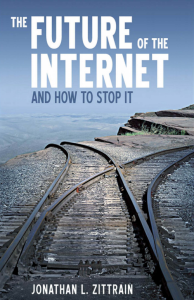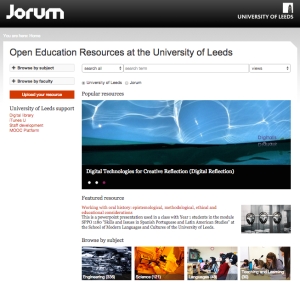Sustaining the outputs of projects and programmes beyond their initial phase of funding is a weel kent problem but it is one that we still struggle to solve. Back in 2009 when Cetis were working with Jisc to scope the technical guidelines for the forthcoming UKOER Programme we attempted to address this issue by recommending that projects deliver their content through multiple platforms. One of the few actual requirements among the programme guidelines was that projects must also deposit their content in JorumOpen, in order to act as a safeguard against resources being lost:
Delivery Platforms
Projects are free to use any system or application as long as it is capable of delivering content freely on the open web. However all projects must also deposit their content in JorumOpen. In addition projects should use platforms that are capable of generating RSS/Atom feeds, particularly for collections of resources e.g. YouTube channels. Although this programme is not about technical development projects are encouraged to make the most of the functionality provided by their chosen delivery platforms.
Six years down the line and attrition is taking the inevitable toll. Several of the sites and repositories that hosted UKOER content have disappeared and the sustainability of the content hosted by the national Jorum repository remains uncertain following Jisc’s announcement in June that it intended to retire Jorum and “refresh its open educational resources offer”.
These problems were brought into sharp focus by Viv Rolfe (@VivienRolfe) of the University of West England this week when she tweeted
Viv’s tweet sparked a lengthy discussion on twitter that drew in several of the community’s most incisive critical thinkers on open education including Simon Thomson (@digisim), Pat Lockley (@Solvonauts, @patlockley), David Kernohan (@dkernohan), Leo Havemann (@leohavemann) and Theresa MacKinnon (
The wide ranging discussion touched on a number of thorny issues relating to OER preservation and sustainability. I’ve created a Storify of the entire discussion here: The Challenge of OER Sustainability
Self-hosting was seen as one alternative to using institutional or national repositories to host OER, with WordPress being a popular platform in some quarters. David Kernohan took this one step further, asking if individuals who want to self-host OER should run their own repositories. While this is an interesting idea it was regarded as a rather heavy weight solution to the problem and Pat argued that repositories are the wrong tool for the job as they sit outside standard academic digital literacies.
The discussion then turned to cross-publishing. The LOCKSS (Lots of Copies Keep Stuff Safe) approach to digital preservation was regarded as one good way to ensure that content does not disappear. However if content is deposited in multiple places and scattered across the web then other issues arise relating to how to find and curate content. Pat commented that multiple deposit may solve “lost hosting” but complicates “find”. Aggregators and the dark arts of search engine optimisation clearly play a role here, however search engines’ ability to accurately interpret licence information is still problematic.
The Solvonauts aggregator and OER search engine represents a good example of one sustainable approach to locating OER content. Solvonauts has aggregated 141867 OERs, it costs around $50 a year to run and the code and database are shared on Github. If Pat falls under a bus tomorrow, it’s business as usual for Solvonauts. (Pat’s phrase, not mine. Please don’t fall under a bus Pat!) Of course Solvonauts can only find content that it is there; it can not solve the problem of how to sustain content if servers are switched off or repositories shut down with little or no warning, which brings us right back to the issue of repository sustainability.
Leo Havemann commented that the main problem is lack of funding rather than the failure of repositories per se and Simon Thomson suggested MERLOT as a good example of a sustainable OER repository. This resulted in a rather heated discussion about whether MERLOT can be regarded as an OER repository as not all the content is CC licensed and there is a cost associated with deposit. Simon has already blogged an excellent summary of this discussion and the points he made regarding MERLOT which you can find here: The challenges of maintaining OER repositories, but why we must never stop trying.
Ultimately there is no simple answer to the question posed by David.
Where should I put my OER so people can find and use it?
Pat’s answer may suggest a way forward in the short term.
I would place content into any platform which supported some licensing, or was free hosting, caveated with a bulk download option should the platform close.
Even if there is no easy answer, sustainability of OER is a pressing issue that requires immediate attention and a collective response from the community. Digital curation and sustainability of OERs may represent a challenge, but as Simon pointed out in his own blog post, we must never stop trying.








